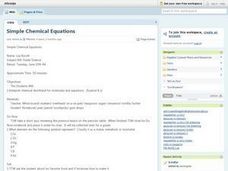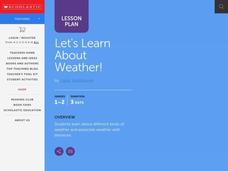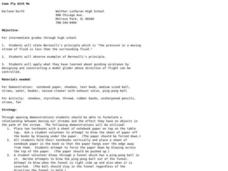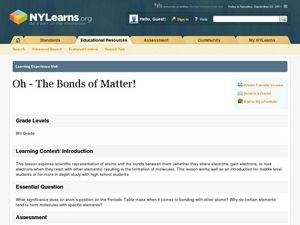Curated OER
Ranger Rick: Dissect a Pumpkin
In this pumpkin activity worksheet, students examine pumpkins inside and out and then respond to 4 short answer questions regarding their observations.
Curated OER
Ranger Rick: Name Game
In this Ranger Rick activity, students observe birds in nature, draw them, make up names for them, and note their real names.
Curated OER
Ranger Rick's Tracking Frogs
In this Ranger Rick's tracking frogs activity, students find a pond, observe and record what signs of frogs they can see or hear.
Curated OER
Get Into Insects
In this insects worksheet, students collect 3 insects. Students draw the insects and observe what they are doing. Students fill out an observation chart.
Curated OER
Ranger Rick's Observing Night Lights
In this Ranger Rick's observing night lights worksheet, students observe and record the lights in their neighborhood at night and the effect on the environment.
Curated OER
Good Bug Survey
In this bug survey worksheet, students fill in squares on a graphic organizer with information about flowers currently blooming, hiding places for "good bugs," and any bugs they have seen that are helpful for pollination, as food for...
Curated OER
Rock Hounding
In this rocks worksheet, students draw the rock they found, write where they found it, and describe it. Students do this for 2 rocks.
Curated OER
Butterflies A-Flutter
In this butterfly worksheet, students read about butterflies, then complete a graphic organizer, drawing pictures of 2 different butterflies, using a table of "stay-safe" butterfly tricks to help complete the chart.
Curated OER
Forest Life- Wood Bug Study
Examine wood bugs and their habitat. Learners gather wood bugs and examine their bodies. Then discuss their body parts and how they help them survive. They also predict where they think wood bugs live to then graph the class results.
Bonneville
Compost Bioreactor Design
Organic waste is a hot topic. The second of three installments in the Bioreactor Water Heating unit challenges pupils to create bioreactors that collect energy released from compost. After watching videos on the properties of water and...
Texas Education Agency (TEA)
Gaining Understanding and Information from Introductory Material, Headings, and Other Division Markers in Texts (English III Reading)
All teachers are teachers of reading! The 13-part interactive series ends with a lesson that teaches learners (and their instructors) how to approach reading their textbooks. After learning about several strategies, users test their...
Curated OER
Classifying Dog Breeds
Students classify dog breeds. In this animal science lesson, students research various breeds of dogs on the Internet and classify breeds into small, medium, and large breeds. Students illustrate their classification notes with pictures.
Curated OER
Classification of Animals
Students explore animal characteristics by participating in a SMART board activity. In this animal classification lesson, students utilize a sorting chart to divide different animal names by their observable characteristics. Students...
Curated OER
Forces and Acceleration Unit
Students investigate that an unbalanced force, acting on an object, changes it speed or path of motion or both, and know that if the force always acts toward the same center as the object moves, the objects path may curve into an orbit...
Curated OER
Weather Journal
Fifth graders keep a weather journal. In this weather lesson, 5th graders define types of weather, summarize types of weather, and keep a weather journal.
Curated OER
Plasmolysis in Elodea Plant Cells
Students microscopically observe various subcellular components. They determine the effects of different salt solutions on Elodea plant cells. Students explain the major function of a cell membrane and describe its structure.
Curated OER
Force And Motion
Eighth graders investigate the concept of force and motion while conducting short class activities. They compare the differences of potential and kinetic energy while rolling objects on a ramp. Students also measure the distance that...
Curated OER
Unit Conversions
Eighth graders identify the different types of measurements and the instruments used to measure each type. After taking notes, they complete a bubble chart to examine the conversion between the units. To end the lesson, they practice...
Curated OER
Simple Chemical Equations
Eighth graders interpret the chemical symbols and shorthand used for molecules and equations. Through guided practice, 8th graders work to decipher and interpret the symbols for chemical equations. An opportunity for independent...
Curated OER
Let's Learn About Weather!
Students read several weather-related stories. They brainstorm weather words and use them as they make a weather booklet that includes pictures, a story of their own, and observations they make about the weather outside on that day.
Curated OER
Come Fly With Me
Students apply the Bernoulli Principle. In this flight lesson, students design and test a glider.
Curated OER
Oh - The Bonds of Matter!
Eighth graders identify the types of bonds elements form. In this chemistry lesson, 8th graders represent valence electrons with dot structures. They draw and label different atoms.
Curated OER
Biome-Ecology Unit with a "Design a Zoo" Extension
Students participate in a three part unit about biomes. Part one, students research the biomes of North America and part two consists of research on zoos and a field trip to a zoo. While part three ties together the first two when...
Curated OER
Metals, Nonmetals, Metalloids
Students recognize that metals, nonmetals, and metalloids have common attributes. They Identify physical and chemical properties. Students define ores and identify where ores can be found.



